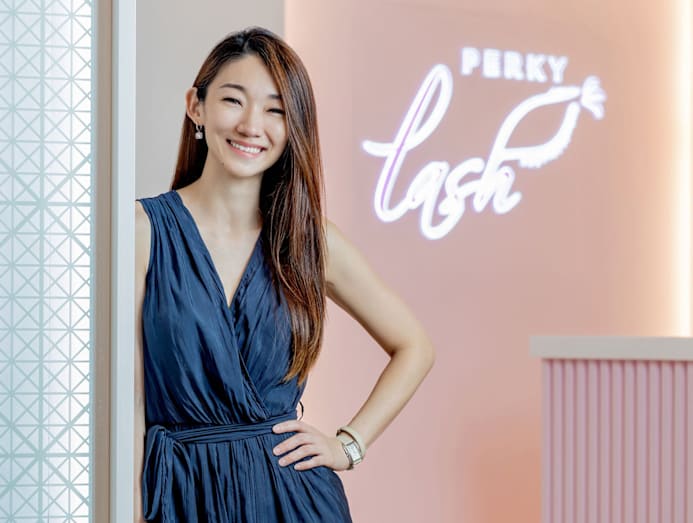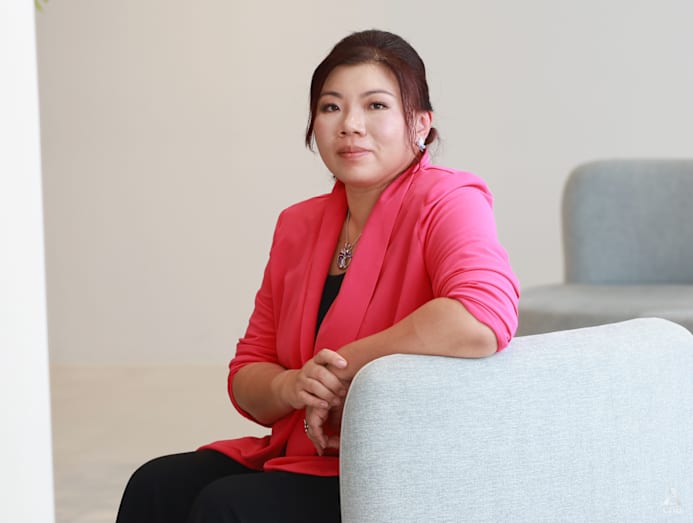Women are starting more companies than ever in Singapore but why are their businesses slow to take off?
Caregiving duties, risk aversion and gender bias are still holding women back from growing their companies at the same pace as men.

The number of women-owned companies in Singapore grew from 16,300 in 2010 to 36,000 in 2022. (Photo: CNA/Raj Nadarajan)

This audio is generated by an AI tool.
After spending more than a decade working in marketing roles for global enterprises, Ms Sophia Ng, 36, decided to leave the corporate world behind.
She was inspired by the way her eight-year-old daughter learned and grew through play, so in 2022 she co-founded Kidztropic, an indoor play space that was aimed at being both fun and educational for children.
"During my younger days, climbing the corporate ladder was very important to me, but after 9 to 10 years, I didn't need titles to justify my value as a person," she said.
Her decision to swap the office for slides and trampolines reflects a larger trend among women, who are keen to strike out on their own.
The number of women-owned companies in Singapore grew from 16,300 in 2010 to 36,000 in 2022, data from the Department of Statistics showed. This accounts for one in four of all resident-owned companies that year.
Their contribution to the economy has also expanded sharply: Female-owned companies accounted for 21.3 per cent of the total revenue of resident-owned companies in 2022 – up from just 10.3 per cent in 2010.
Despite their growing presence, however, women-owned businesses are not keeping pace with their male counterparts.
New data from OCBC found that women-owned small and medium enterprises (SMEs) in Singapore experience about 30 per cent lower sales turnover growth in their first three years compared to those owned by men.
The struggle with early revenue is a struggle that Ms Ng knows all too well. While her startup provides indoor play spaces for children, her entrepreneurial journey thus far has been far from child's play.
Ms Ng's first outlet at The Poiz Centre faced an unexpected one-month delay in opening, while her second outlet at Annex@Furama was delayed for twice as long.
With their initial revenue projections and operational timelines gone awry, Ms Ng and her co-founder opted to bootstrap their way out of debt, using personal funds to sustain operations.
This challenge of growing a business in the early years not only poses personal difficulties for women entrepreneurs but has a far reaching impact at the national level, with SMEs accounting for 99 per cent of businesses and employing 70 per cent of our workforce.
This slower momentum facing women-owned businesses will, in the long-run, hurt the dynamism and productivity of the SME sector, said experts.
Dr Julien Salanave, professor of practice in entrepreneurship and innovation at ESSEC Business School, Asia-Pacific, said that such firms are left more vulnerable when faced with disruptions like downturns or rising costs.
He noted that early growth is closely linked to a firm’s chances at survival too.
If the growth gap between men and women-led firms persists in the long-term, Dr Salanave said Singapore risks wasting the potential of women entrepreneurs who could scale up their businesses, leaving talent and innovation on the table.
STRONG FOCUS ON FAMILY
CNA TODAY spoke to 10 female entrepreneurs and found that slower revenue growth in the early years is often tied to caregiving responsibilities, a more cautious approach to risk and the preference to establish stability before expanding.
Ms Jasmin Tay, who opened her first beauty store Perky Lash at NEX mall in 2019, is one such example where caregiving responsibilities almost got in the way of her business growth.
When she opened her first store, the days were relentless with the work that comes with being a startup founder, juggling supplier calls, training staff and balancing the books.
Even at night, the work continued in a different form – tending to her one-year-old's night feeds.

Ms Tay found this balancing act a major struggle at first and said that without the support she received from her in-laws to help with her toddler her company's growth would have definitely taken a hit.
"I think family support is crucial in the growing stages of a business, especially if one has parental commitments," said the 39-year-old.
"That could be one reason why some women's businesses grow slower – you would have to split your time and resources between your kids and your business."
Similarly, for Ms Su Anne Mi, the co-founder of premium workspace company The Great Room by Industrious, balancing motherhood with leadership has not been easy.
And despite having three kids in nine years, the juggling act has not gotten easier over time either, she said.
"I’ve never had what you’d call a typical maternity leave; perhaps a short period of peace, but very quickly the calls and decisions start to come in," said Ms Mi.
"In some ways, that’s a blessing, but it also makes it a difficult balance for working mothers who want to spend time with their children while also showing up fully at work."
Today, Ms Mi manages and oversees 12 locations across Singapore, Hong Kong, Bangkok and most recently Sydney, with two more locations in Singapore set to open in the next year.
But for some women founders, however, that strong focus on family becomes a deterrence to expanding their business.
Entrepreneurship has become attractive to women because it gives them more control over their time, and in most cases to take care of their children, said Ms Sher-li Torrey, who started Mums@Work in 2010 to connect business owners struggling to juggle motherhood and their business aspirations.

She said that for some women business owners, raising funds and expanding an already profitable business defeats their original purpose of starting a business – to have more time at home with their children.
"Male venture capitalists often tell me that they find female entrepreneurs to be very cautious in making a decision to expand," she said.
"And it's true – the mum-preneurs would share with me: 'If I do this, do I then compromise on my own family time?' But men don't say that."
Ms Torrey, who is also a mentor for an accelerator programme in Tokyo for women, added that she sees the same apprehensions overseas.
"They would say: 'I can't go too big because my family needs me.'"
RISK AND LOAN-AVERSE
Interviewees said caregiving commitments, however, tell only a fraction of the story.
Lower revenue growth can also be attributed to another factor: Women entrepreneurs tend to take up fewer loans than men in the first years of their business.
Ms Iris Ng, head of emerging business for global commercial banking at OCBC, told CNA TODAY that women who did secure financing were often able to bridge the revenue growth gap.
"From our interactions with business owners, it is not unusual for women-owned enterprises to avoid loans as much as possible, and opt instead to use their own means to grow their business," she said.
Indeed, a common thread among the entrepreneurs interviewed was the belief that women founders tend to be more conservative in their approach to raising funds.
When Ms Beatrice Liu's traditional chinese medicine health-tech company Oriental Remedies Group faced a throng of pandemic-related challenges in 2020 – a year after she co-founded it – the possibility of pitching to investors never crossed her mind.
Ms Liu said she and her co-founder bootstrapped and survived their way through the entire crisis by pivoting strategies, slashing their own salaries and tapping into their savings to tide through the tough period.
Though she declined to say exactly how much she had to fork out to do so, she noted that it was a sum in the "five-figures".

In the end, the company kept all their staff, and even managed to provide them with increments and bonuses.
Looking back, Ms Liu said that dipping into her savings was a good thing, because she did not have to give up equity to investors so early on. Still, she believes that this conservative nature does hold other women back in their businesses.
"A lot of women I've seen need to have a foolproof plan – to know with a hundred per cent guarantee that they can deliver something – before they pitch for funding," she said.
"I think that actually plays against women, because more funding early in your business translates to sales. You have the resources to do more marketing, among other things."
DOES GENDER PLAY A PART WHEN SECURING FUNDING?
Dr Kenneth Goh, associate professor of strategy and entrepreneurship at Singapore Management University (SMU), said that while women bring a broader set of legitimate motivations to entrepreneurship, the potential consequence is that they may "unintentionally reinforce societal biases that cast doubts on women’s entrepreneurial abilities".
These biases, he said, can create barriers to accessing capital, business networks, and other resources that enhance early growth.
A 2019 research report by HSBC Private Banking titled "She's the Business" showed that two in five female entrepreneurs in Singapore had experienced gender bias when raising capital, while 59 per cent had been denied funding – compared to 50 per cent globally.
Although there is a lack of more recent data in Singapore pertaining to whether women-owned businesses receive less capital or are turned down by investors, more research in the US provides further evidence.
Analysis from a working paper led by a researcher at the Yale School of Management found that women receive 14 per cent less funding than male founders in general, and an additional 8 per cent less if the investor has experienced a failure by another woman-led startup in the past five years.

Ms Ng of Kidztropic said that a common obstacle that women face when speaking to potential investors is the stereotype that women may run a business more "emotionally".
She also recalled a potential investor questioning whether her venture was simply a passion project, asking if she was "serious" or "just a housewife with a hobby”.
Oriental Remedies' Ms Liu has likewise noticed a difference in investors' framing of questions towards different genders too.
Through her own experiences speaking to investors and in her past work as a strategic consultant, she noticed that men may occasionally receive more "big-picture" questions pertaining to the company's vision and goals.
On the other hand, women may be fielded queries on execution more often, which can reflect underlying unconscious biases that end up affecting pitch outcomes.
CLOSING THE GAP
With the view of enabling women-owned firms to grow at the same pace as men's, women founders told CNA TODAY that they hoped more could be done to improve their access to capital.
For instance, Ms Jamie Tan, the founder of edutech firm Flying Cape Technologies, suggested that repayment terms for business loans can be adjusted according to how conservatively or aggressively a business is run.
"Someone like me may not be too keen to get a huge loan at fixed interest rates – but if the loan can be split in a way to help me manage its costs, it can convince women to take bigger steps to grow their business," she said.
Dr Salanave of ESSEC Business School likewise said gender-informed underwriting – where banks adjust their assessment criteria in approving loans to avoid gender bias – has been proven to encourage women-SME lending globally.
OCBC announced last month that it would provide social loans to 10,000 women entrepreneurs across Singapore, Malaysia, Hong Kong and Indonesia by 2030 through dedicated SME programmes.
These loans aim to enhance the socioeconomic advancement of women and strengthen the growth and resilience of women-owned businesses, the bank said.
Under the programme in Singapore, women-owned SMEs can secure financing of up to S$100,000 within their first two years of incorporation.
Ms Ng of OCBC said the bank organises an event per quarter dedicated for women entrepreneurs – ranging from networking to delivering educational content – as part of its outreach efforts as well.
Ms Tan the edutech founder said such gender-specific initiatives are important as it speaks to female founders and encourages them to "come out of their shell".
"All the self-limiting beliefs or preconceived notions that women have – like it being more difficult to secure a loan because they are competing with male founders – get wiped out," she said.
"In a subtle way, that specificity also encourages women to take the first step and consider whether they need a loan."
Interviewees across the board also shared the important role that community plays in supporting women entrepreneurs, in spirit and in tangible terms.
An example of such a community is the Singapore Women Entrepreneurs Network (SG-WEN), which facilitates knowledge sharing between founders, mentors, and helps them build key contacts.
Ms Tay of Perky Lash, who is part of SG-WEN's membership subcommittee, said the community has been growing exponentially since the group's founding in 2021.
"Sometimes we just need a sounding board – some advice from women who are also entrepreneurs, who understand what we're going through."












